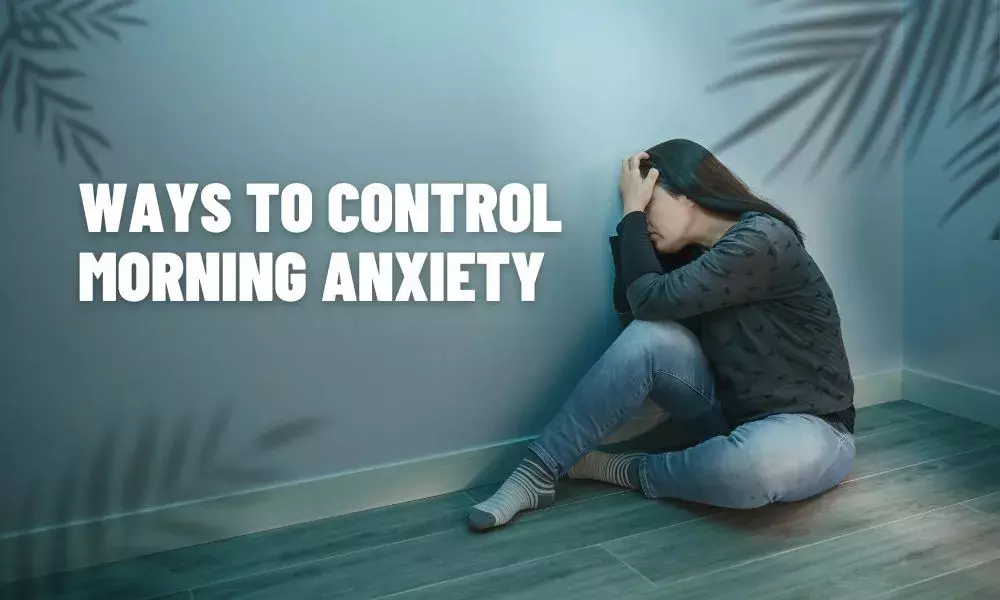Sometimes, as we wake up in the morning, we may experience racing thoughts and worry excessively. These thoughts may make us feel stressed throughout the day.
Table of Content
-
What is morning anxiety?
-
What are the symptoms of morning anxiety?
-
Causes of morning anxiety
-
Ways to calm morning anxiety
What is morning anxiety?
Morning anxiety generally refers to waking up with feelings of stress and worry. One may experience it if they are dealing with changes in life or experiencing distress.
Waking up with anxiety can indicate an anxiety disorder like Generalized anxiety disorder (GAD). People with GAD worry about everyday activities like work, education, family, relationships, finances, and health.
What are the symptoms of morning anxiety?
Anxiety of any sort is harmful to our overall health. Symptoms of morning anxiety may typically relate to headache, fatigue, restless, irritability, faster heart rate, difficulty concentrating, difficulty managing worry, and digestive issues.
Causes of morning anxiety
-
Lack of proper undisturbed sleep
-
Anticipating the day’s responsibilities
-
Not eating well, the night before
-
High levels of cortisol
-
Lack of routine
-
Bad dreams or nightmares
Ways to calm morning anxiety
Through a proper and healthy lifestyle, one can deal with morning anxiety. If one experiences extreme stress and worries, it is vital to take preventive measures to reduce this anxiety.
-
Getting a better sleep
The most crucial thing to reduce morning anxiety is to sleep well the night before. This is essential for people who have anxiety disorders or sleep disorders. People with anxiety usually find it difficult to fall asleep as they tend to overthink issues. The lack of proper and good sleep can raise the anxiety level. An undisturbed sleep of 7 to 9 hours each night is vital to reducing anxiety. One can practice good sleep, which may include:
-
Maintaining the same time for going to bed and getting up every day.
-
Avoiding screens just before bedtime.
-
Practice relaxation techniques
A calmer morning free from anxiety can be achieved with mindfulness and relaxation techniques:
-
One must avoid getting up late. Rushing makes us feel more stressed and anxious. Getting up a bit earlier helps us feel in control of our morning and gives us time to take steps to prevent anxiety, like eating breakfast, exercising, and planning the day.
-
5 minutes- Meditation. Even a five-minute meditation can help reduce anxiety; it can help calm our thoughts and improve our focus on positive things.
-
Limit scrolling through social media. Watching unnecessary content as we get up may contribute to anxiety levels. One can listen to slow, soothing music in the morning as it reduces anxiety.
-
Follow a morning routine
Morning anxiety can make it difficult to start the day positively. Having a good routine for the first two hours of the day can help to get our day started and interrupt the negative thoughts that may cluster our thought process.
Our morning routine can include things that may reduce morning anxiety and increase positive energy. These may include a short meditation, light exercise or walking, preparing a meal, including breakfast, and planning the day’s priority to the activity list.
-
Having breakfast
Low blood sugar in the morning, which is caused due to not eating all night, can often cause morning anxiety. Generally, good, and healthy eating habits help cope with anxiety. Therefore, one must not skip breakfast. Incorporating foods with magnesium can help reduce anxiety. These may include:
-
Bran cereals and other whole grain products like oatmeal or whole grain toast
-
Nuts like almonds, hazelnuts, and cashews
-
Fish, including smoked salmon
- Be Cautious of Caffeine
Excess intake of caffeine worsens the symptoms of anxiety. It can promote and increase anxiety. Therefore, one must limit morning coffee or avoid it altogether. A coffee mug can be replaced by sipping a glass of lemon water in the morning.
-
Exercising in the morning
Light exercising in the morning can be particularly beneficial. Exercises that incorporate mindfulness can be particularly helpful in managing anxiety. If one experiences morning anxiety, certain physical exercises like yoga, tai chi, concentrated breathing exercises, or walking can be helpful.
Morning anxiety is an anxiety disorder that can interfere with our overall well-being and functioning. One must adopt a healthy lifestyle to control and reduce anxiety. However, if, through the above techniques, one is not able to manage anxiety, then professional help must be sought.





